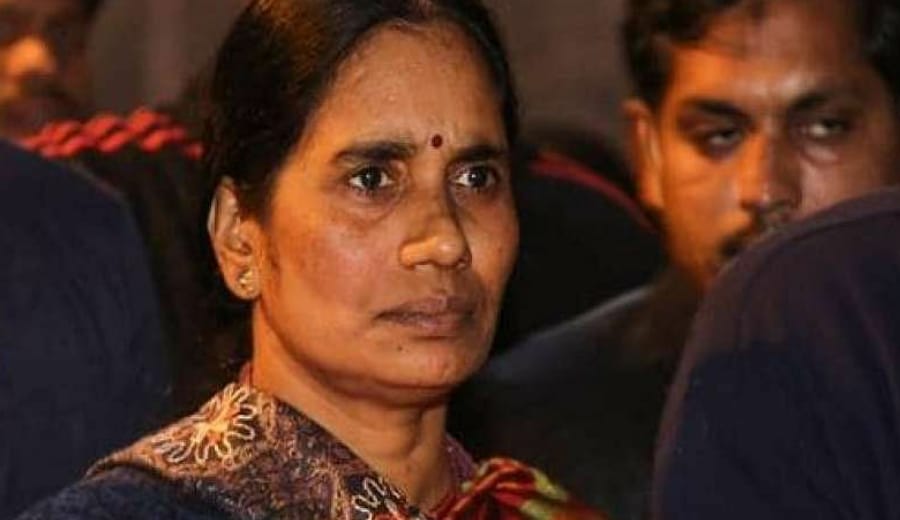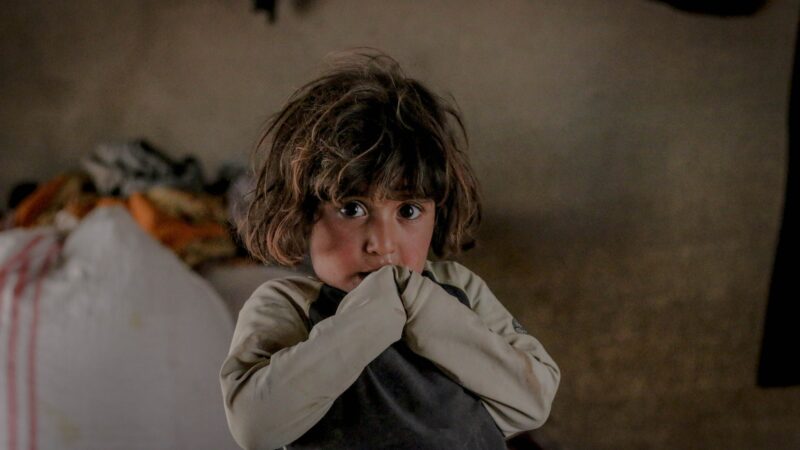Delhi bus rape victim’s mum speaks out

22 Nov 2013,
It’s almost a year since her daughter, Jyoti Singh, was brutually gang raped on a bus in New Delhi and died of her horrific injuries 13 days later. But Asha Devi, 46, will never be able to forgive Jyoti’s murderers and says she wants to see them hang as justice for her girl. Her voice cut through my thoughts. “I’m off to the cinema,’’ my daughter Jyoti Singh called out. I glanced at the clock. It was 5.45pm. “OK, love,” I smiled. “See you later, don’t be late.” Jyoti was 23, but I always worried about her. I worried about all of my children – Gaurav 20, and Saurav, 15. My girl loved the cinema and had been talking about going to see Life of Pi for ages. It was good for her to take some time out – she was in the final year of her physiotherapy degree course at a college in Dehradun about four hours’ drive away, and had come to Delhi looking for an internship. My Jyoti was a clever girl, she always had been. She wanted to become a doctor, but we cocouldn’tfford to put her through medical college. That’s why she had opted for physiotherapy instead. She’d been studying hard and she deserved a night out with her friend, Awnindra Pandey. They’d been friends for years and often went to the cinema together. Jyoti had met Awnindra, 28, an IT specialist, through a friend while she was working part-time at a call centre in the city to help pay for her studies. We had spoken to him on the phone often and he came across as a nice boy. So after Jyoti left, I got busy in the kitchen preparing a dinner of chappatis and a vegetable curry in our modest two-room house in Dwarka, a semi-rural suburb of Delhi, and didn’t notice time fly by. Around 8pm, my sons Gaurav and Saurav returned home. It was a Sunday, December 16, and they’d been out with their friends. “Are you hungry?” I asked them as they looked to see what I was cooking. My husband Badri Singh wouldn’t be home for ages. He was as a baggage loader at Delhi Airport and worked shifts. I wasn’t expecting him until 10.30pm so I would dish up the boys’ dinner, then eat later with Badri, 54. I bustled around the kitchen, ladling out the curry for my sons. It was 9pm, and I sat chatting with them about their days, and before I knew it another hour had gone by. “Jyoti should have been home by now,” I mumbled, and tried calling her on her mobile. There was no answer. The phone rang but she didn’t pick up. Worry beat inside me. “Where is she?” I wondered. Why wasn’t she answering the phone. Jyoti had never been this late before and always called if she was delayed. I couldn’t relax. New Delhi is a dangerous city, everyone knew that, but Jyoti was a sensible girl. She wouldn’t do anything risky. My husband arrived home at 10.30pm, and I ran up to him. “Jyoti isn’t home yet,’’ I cried, fear taking hold now. I was getting hysterical. “I’ve been calling her phone but there’s been no answer. I just feel something’s happened to her.’’ Instantly he looked as worried as I was. He called Awnindra’s mobile but there was no answer. Desperate, we started calling some of her friends just in case they knew their whereabouts but no one had heard from them. “Something’s happened,” I kept saying, dialling Jyoti and Anwindra’s phones over and over again, hoping one of them would pick up and tell us they were safe.” *** About 25km away, in a slum called Ravidas colony in South Delhi, Ram Singh and his younger brother Mukesh were wondering how to liven up their Sunday. A widower, Ram, 34, earned a living as a bus driver ferrying school children. Sharing a one-room house with Mukesh, 26, who worked intermittently as a taxi driver, they were notorious in the neighbourhood for their rowdy behaviour and violence. Together with two friends who worked on and off as assistants on the bus – 17-year-old Raju (name changed) and 28-year-old named Akshay Thakur – they began drinking in the evening. After three hours of hitting the bottle, at around 8pm on Sunday, Ram Singh got a call from the owner of the bus asking him to get him a cylinder of cooking gas. “Let’s go and have some fun,’’ he reportedly told his friends and all four set off in the bus. On the way they picked up two more friends – Pawan Gupta, 19, a fruit seller, and Vinay Sharma, 20, a cleaner and gym instructor – and together they headed off to the city. Hoping to make a quick buck, they stopped their vehicle at several designated bus stops calling out for anyone who wanted a ride to Nehru Place, a shopping centre. They managed to get one fare. The man who got in, a carpenter, was promptly beaten, robbed of his phone and Rs1,400 (Dh82) and dumped from the vehicle. He didn’t bother telling the police. The six continued their inebriated revelry driving across the city looking for more victims. According to police reports, to entice people into the bus, three of the men sat on different seats pretending to be passengers. Meanwhile, at around 9pm, Jyoti and Awnindra left the cinema in Select City Mall, in Saket, after watching Life of Pi. Because it was Sunday, there were no official Delhi Metropolitan Corporation buses to take the duo back to Dwarka, a distance of around 24km. They tried hailing taxis and waving down auto rickshaws but no one wanted to travel that distance. The pair persuaded one to take them two miles to another bus stop where they hoped to catch a bus home. As they stood on the road, a bus with blacked-out windows stopped near the duo. Mukesh was at the wheel. Raju, the youngest, leaned out from the open door and asked if the duo wanted a lift. Jyoti and Awnindra said yes and jumped on the bus, paying Rs20 fare each as the bus headed off towards Dwarka. *** “With each passing minute Badri and I were growing increasingly desperate. Jyoti and Awnindra had not called and for some reason I kept thinking something had happened to my daughter. Then at 11.15pm, the phone rang. “Are you the parent of Jyoti Singh?’’ a man who identified himself as a police officer asked my husband. “Your daughter has been in an accident and has been admitted to the Safdarjung Hospital in Delhi. You need to come here immediately.’’ I saw Badri’s face go pale even as he was listening to the man. “What’s wrong?” I asked and when he told me I almost collapsed. “I knew something was wrong with my girl,’’ I cried. Badri meanwhile dashed out. Since we don’t have a car, he ran to ask a neighbour with a motorbike to give him a lift to the hospital 17km away. “Go, please go,” I yelled. “Me and the boys will take a cab.’’ Everything was a blur and I was crying, thinking the worst. Had she been in a car accident? Had she been attacked? I was trembling and crying as I waited for a taxi. None came and it was an hour later before another neighbour finally gave us a lift. My mind was racing, and I just wanted to see Jyoti. So as soon as the car stopped outside the hospital, I started running through the corridors. A nurse told me Jyoti had been admitted to the intensive care section and a knot of fear twisted inside. What had happened to my girl? I entered the room and saw my daughter lying on a bed. Her eyes were closed and she was covered with a hospital regulation green blanket. There were a few nurses hovering around my child. I ran up to her and held her hand, then touched her forehead gently. “Jyoti,’’ I called out. “I’m here.’’ Her eyelids fluttered open partially, then she started crying. “Don’t worry, you’ll be alright, beta (child),’’ I said, trying to calm her. “Ma,’’ she said softly. “Ma, I’m in so much pain, please make the pain go away.’’ She started sobbing and I had to bite my lip, to stop my own tears falling. I had no idea what had happened yet, but my girl was obviously in agony, and I just wanted to take her pain away. She was flitting in and out of consciousness. “My darling girl,’’ I whispered, kissing her forehead, not knowing how I could help her. She appeared too weak to talk but was making an effort to tell me how she was. Eventually a doctor came up to talk to us. “I’m afraid there’s very little we can do for her,’’ the doctor said. I almost fainted when I heard his words. Then I began shouting. “No!” I cried, fury mingling with my fear. “You have to save her, you have to save my Jyoti.” I was sobbing now, my entire chest heaving. Badri held me, moving me away from the bed so the nurses could look after Jyoti. But I wouldn’t be quiet. “What happened to my baby?’’ I asked him. He was stroking my face and telling me not to worry, but how could I not? “She’ll be alright,’’ he kept consoling me. It was 1am, and the police came to the ICU to take Jyoti’s statement. Although extremely feeble, she gestured with her hand for me to come to her side. “Ma, please stay by my side,’’ she said, crying. “I will, darling. I will be here with you,’’ I promised, taking her hand. Then she began to tell the police what had happened – and I realised she hadn’t been in an accident. She had been brutally assaulted on a bus and raped. As difficult as it was to listen to it all, I didn’t want to leave her bedside even for a second. Badri couldn’t sit in. He just couldn’t bring himself to hear any details, but I broke my heart listening to everything my Jyoti had endured. It was an horrific story but my daughter, even though in obvious pain, was determined to tell it.” *** Within minutes of Jyoti and Awnindra getting on the bus, the men began to antagonise him. “What are you doing with a girl so late?’’ one of them reportedly asked. Ram Singh began to verbally abuse the IT professional as the bus headed for the outskirts of the city. Then he got physical and he threw a punch. Within minutes a fight had broken out. Jyoti began screaming, but one of the men grabbed a metal bar and began hitting Awnindra with it. Overpowered, Awnindra lay helpless on the floor of the bus covered in blood and reeling from his injuries. He was stripped. Crying for help, Jyoti banged on the darkened windows as Mukesh drove the bus through the Delhi evening traffic. Two of the men dragged her to the rear of the bus and began beating her. Then one by one, all of the men raped her. Although she fought back, biting and scratching, the petite woman was no match for the men. All the while, Mukesh continued driving the white bus, passing through three police checkpoints before he turned around at some point and began heading back into the city. Eventually, the men stopped the bus on the side of a main road and dragging the semi-conscious Jyoti and Awnindra by the hair, threw them onto the road naked and bleeding. Some reports say that the driver of the bus made an attempt to run over the duo, but Awnindra managed to drag them both away from the road. The bus then disappeared. Amazingly, despite their appalling injuries, the two tried standing up and waving down a vehicle for help. No one stopped. Vehicles would slow down to look at them, hoot their horn then speed off, Awnindra would later tell the police. For close to 40 minutes, the couple lay on the slip road of the highway before a small crowd gathered around them. Nobody was willing to make the first move or take responsibility for helping the two lying on the ground. Eventually, someone called the police and officers turned up. *** “My child was unbelievably brave as she gave her statement. During some parts she cried, but I held her hand throughout, willing her on. I can’t describe some of the things they did to my Jyoti… I can’t believe there are human beings alive who can be so evil. She was determined to use all her remaining strength to make sure that the police had the details about the crime. I felt like breaking down and crying but I had to hold her hand and listen. I wanted to be strong for Jyoti. I was aghast when I heard that while my baby girl was lying on the road naked and in agony and Awnindra was covered in blood, the officers were arguing over which police station should claim the case. Even as Awnindra was begging them to rush them to hospital they were continuing to argue. By the time they brought my girl to the hospital, she had lost a lot of blood. Awnindra was also in the hospital being treated and giving his statement. Badri, who had left the room, was shellshocked and horrified when I later told him the nightmare our daughter endured. He could only listen and cry.” *** Jyoti’s external and internal injuries were horrifying. Parts of her intestines were severely damaged and even as doctors attempted to remove the most affected parts to prevent infection, they knew they were fighting a losing battle. One doctor reportedly told Badri that his daughter was unlikely to survive more than a few hours. She was put on a ventilator as news of the rape hit the headlines. Protests began in Delhi and across the country. Marches, demonstrations and night long vigils were being organised on a scale never before seen in India. Dubbed in the media as ‘Delhi’s daughter’, ‘Nirbhaya’ and ‘Braveheart’, Jyoti was fighting for her life in the hospital even as the police managed to zero in on the culprits – from CCTV footage of the routes through which the bus passed – and soon began making arrests. Ram Singh was the first to be caught. The others followed. *** “We were all very hopeful our Jyoti would survive. We really believed she would come through. Even she was sure she’d recover. I never left her side and I talked to her. I told her stories of when she was little, about what was happening outside the hospital, events in our family, about her friends…. I was doing all I could to keep her mind occupied. She continued to slip in and out of consciousness. One time when she opened her eyes, she told me, “Ma, I’ll be fine. When I get out of here, we’ll start again.’’ Another time she said, “I want those men found and hanged.’’ She would cry just remembering what had happened, and I’d try to calm her. “Don’t think about them,’’ I’d say, wiping her forehead with a damp cloth. On some occasions when she regained consciousness, she signed that she wanted to write something. She was unable to speak because of the feeding tube in her mouth so she scribbled notes. One afternoon five days after the horrifying incident, she wrote, “I want to live, I want to survive and stay with you all.’’ I couldn’t stop crying. Then I learned the whole of India was coming out in support of our Jyoti. When I heard about the protests on the street I was overwhelmed with pride – pride that my daughter had had such an effect on people.” *** On Christmas day, nine days after the attack, the young woman’s condition began to worsen. She had serious internal bleeding and her vital signs were failing. *** It was December 26, and I wondered whether Jyoti would be able to eat some food like dhal, vegetable and chappatis. I knew it would help her to build her strength. But she was almost constantly on the ventilator and was clearly in a lot of pain whenever she regained consciousness. Whenever she came to, she would gesture for me to sit next to her bed and hold her hand. Then late that afternoon, she took a turn for the worse. She suffered a heart attack and the doctors began making arrangements to rush her to Mount Elizabeth Hospital, in Singapore. We were told there were better facilities there. I was with her as she was airlifted to Singapore. I refused to leave her side. I did not want to let her out of my sight. There she underwent a series of operations. Badri and I waited, hoping and praying as she underwent each one that she would come back to us. That went on for three days. But on December 29, Jyoti died. I don’t remember how I found out or who told me the terrible news. The details of those days are still a blur. I have no idea how I coped. I don’t even know how I or Badri returned to India. The only thing I remember is focusing on ensuring the culprits were convicted. Thanks to the public reaction and the world’s media the Government had to act fast in this case. We knew that it can sometimes take years for a case to reach court but some senior members of the Government assured us that Jyoti’s case would go through a fast-track court and a trial would be quick. Our only hope of any peace and closure was to see that the culprits were found guilty and sentenced to death. Like Jyoti had wanted.” *** Jyoti’s body was brought back to India and cremated in Dwarka according to Hindu rites. Later, her ashes were scattered on the River Ganga by her father. As soon as the news of her death spread, angry protests erupted across India. Large crowds began holding vigils with placards reading, “You inspired us all” and, “No to violence against women”, which continued for several days after her death. Earlier, while Jyoti was in hospital, the prime minister made a televised speech expressing concern and sympathy. Now, after her death, celebrities and senior members of society spoke out against the slow judicial system arguing for quicker trials and stiffer punishments. One of the accused ended his life in jail. *** “We were able to give Jyoti a traditional Hindu funeral but it was as if I was behind glass, not really there. I couldn’t focus. It was all blurred. I couldn’t imagine saying goodbye to my darling daughter. “Our girl will get justice,’’ Badri kept telling me. It was all that helped us through every second of every day since she died. We couldn’t sleep or eat. I had no interest in anything but making sure her killers got the death sentence. There hasn’t been a single moment when I have not missed her. We had a wonderful mother-daughter relationship. Jyoti was a loving and caring daughter, she never brought any troubles to our door. She was a tough young woman and had dreams of making a better life for herself. She believed that her studies would give her the opportunity to help all the family live a better life. She was kind and thoughtful, always helping me cook and clear the dishes after dinner even if she had lots of college work. We used to giggle a lot talking about some movie or soap on TV as I prepared dinner. I missed her when she was away at college in Dehradun and used to look forward to having her back. She carried a great burden on her shoulders. She felt very responsible for her family’s future and she wanted to play a role in changing our fortunes by getting a well-paid job and affording things we had never dreamed of. She was our oldest, so parents always have high hopes for their first child, and she never disappointed. Badri and I lost our very first child – a son – soon after he was born. When Jyoti was born she was rushed to intensive care because she was premature. The first month of her life was touch and go because she was very weak but she fought to go on and live. She was born a fighter and was always a fighter. She fought the men during the rape and she fought to stay alive. I guess that’s why we too became fighters – from the moment she was taken from us, we have been fighting the case. It was our reason to get up in the morning and the reason to leave the house. And on September 13, when her killers were finally found guilty at Saket Court, in New Delhi, I was relieved. I was in court. I wanted to see them sentenced to death. They deserved it. When the judge announced the death penalty I stared right at the killers and I saw the fear in their eyes. Two of them were crying. But I didn’t care about their pain and I had no sympathy. I will never forgive or forget what they did to my daughter. Gaurav misses his sister every day. He often tells me, “Life is going to be so difficult without her. Without her guidance I don’t know what to do or how to go about life again. I miss her so much especially in the evenings because that’s the time we used to be together at home. Even when she was away from home doing her studies we would speak to each other everyday on the phone.’’ But now, only emptiness is left. When I wake up in the morning there’s nothing to do, nothing to fight for and I’m reminded more than ever that my daughter is not here; she is not with us. But we will attempt to continue with our lives. I think that is the only way forward. Jyoti has left a legacy and she has given hope of change to India. I feel her life has been sacrificed to teach the world that rapes and this kind of brutality cannot go on. Her death has been a message to the world and an inspiration to women from all walks of life. We have no idea what our future holds now, but I am proud of my daughter and her lasting legacy.” ————- SOURCE: FRIDAY MAGAZINE





